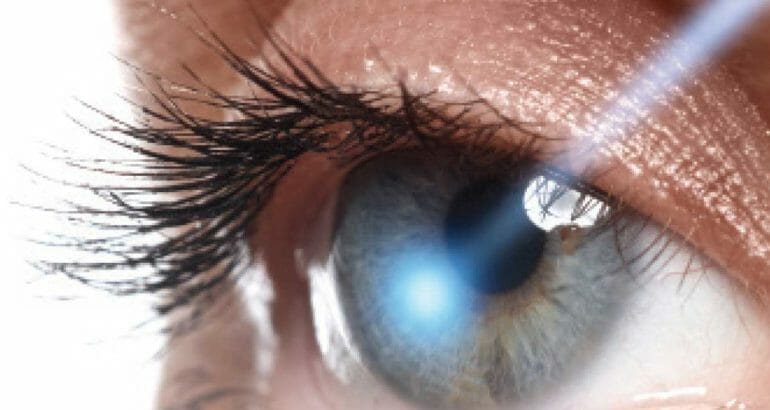 Have you had your eyes checked lately?
Have you had your eyes checked lately?
Our Health Matters visited with ophthalmologist, Joseph L. Parelman, MD, to answer questions about glaucoma disease and LASIK, a popular vision correction surgery. According to the American Academy of Ophthalmology, glaucoma is the leading cause of blindness in people over age 60.
What is glaucoma?
Glaucoma is a disease that damages the eye’s optic nerve, and can cause significant vision loss if not diagnosed and treated early. Elevated eye pressure occurs when the eye does not drain fluid as well as it should. Over time, this can cause damage to the blood vessel system that provides nourishment to the optic nerve. There are two types of glaucoma; primary open-angle, which is the most common, and angle-closure.
Who gets glaucoma?
Anyone of any age can get glaucoma, but the main risk factors are:
- Age – everyone over 40 years of age
- Race – African-Americans and Hispanics
- Family history
- Eye wall thickness
- Eye pressure
Is glaucoma preventable?
We can’t prevent the disease, but we can treat the consequences of the disease. Early detection is key. That is why it is so important to get annual eye exams, especially for people 40 and over. Glaucoma can be detected through routine screening.
How is glaucoma treated?
- Eye drops
- Laser
- Surgery
These treatments work to keep the eye pressure levels stable. Patients whose glaucoma is controlled are generally seen by their doctor twice yearly as a follow-up.
Is it true that marijuana can be used to treat glaucoma?
This information has been around for quite a few years. The effects of marijuana for treating glaucoma and maintaining stable eye pressure have not been fully studied. If you have been diagnosed with glaucoma, talk to your doctor about what treatment option will work best for you. Only your doctor can assess the progression of the disease and recommend appropriate treatment. It is important to note that once vision has been lost to glaucoma, it is permanent.
Even if you don’t think you have a problem with your vision, it is always important to have a once yearly eye exam.
LASIK surgery is a popular option for people seeking to permanently correct vision conditions such as nearsightedness, farsightedness and astigmatism. As always, you should consult your eye doctor.
Dr. Parelman answers some commonly asked questions about LASIK surgery.
What is LASIK surgery?
LASIK (laser-assisted in situ kerotomileusis) is a surgical procedure used to correct common vision problems.
Who gets LASIK surgery?
You should consult your eye doctor to determine if you are a suitable candidate for the procedure. According to FDA and American Academy of Ophthalmology guidelines:
- Candidates should be at least 18 years old (21 in some cases, depending on the type of laser used)
- Your eyes must be healthy and your prescription stable.
- Your prescription must be in the range that can be corrected with LASIK
- You should be in good general health. LASIK may not be recommended for patients with certain chronic diseases such as diabetes, rheumatoid arthritis, lupus, glaucoma, herpes infections of the eye, or cataracts.
- Women should not be pregnant or nursing.
How does it work?
LASIK is an outpatient procedure that takes about 10 to 15 minutes to perform on each eye. You are awake during the procedure, as the only anesthetic used is a topical that numbs the eye. Some patients may be given medicine to help them to relax.
The surgeon creates a flap of thin corneal tissue. The flap is then lifted and folded back, while the laser is centered above your eye. After the laser has reshaped the cornea, the doctor will place the flap in position and smooth the edges without any stitching. During the healing process (about 24 hours), the flap will re-adhere to the surface of the eye.
How soon can patients see results?
Blurriness should improve the next day. However, your doctor will examine your eye and assess your vision during your follow-up visit, which is usually 24-48 hours after the surgery.
It is important to keep those additional follow-up appointments with your doctor to ensure that your eyes heal as they should, you see your best and that there are no complications.
Will I need additional surgery?
Some patients may need a second surgery to achieve best results, but most people enjoy lasting improvement to their vision.
Does insurance cover LASIK?
Contact your insurance company. LASIK is considered elective surgery, because there are other non-surgical and cost-effective options to correct vision: glasses and contact lenses.
How much does LASIK cost?
It varies by practice, but the cost can range between $1,000 and $2,500 per eye.
Whether you are dealing with a disease like glaucoma, or seeking to improve your vision, remember to make eye exams a priority.
About Dr. Parelman
Dr. Parelman is a board certified ophthalmologist with Mid American Eye Center in Prarie Village, Kansas.





